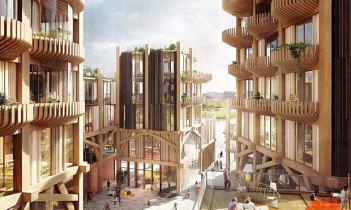Google sister company agrees to scale back controversial Toronto project
The Google sister company Sidewalk Labs has agreed to scale back and refine its approach to a controversial hi-tech neighbourhood it has proposed for a swath of Toronto’s prime waterfront land.
Instead of developing 190 acres of property, as it pitched in June, Sidewalk agreed on Thursday to scale back its plan to the 12 acres it first envisioned in its response to a request for proposals two years ago.
Should the 12-acre project be successful, Sidewalk could seek to expand its smart city, but it will need to go through a formal process again.
Sidewalk has also agreed to store and process data collected in the project on Canadian soil, pay fair market value for the land at the time of sale, team up with one or more real estate partners and allow Canadian companies to use Sidewalk’s hardware and software patents.
“They had to work with us and not be adversarial if they were going to be successful,” said Stephen Diamond, the chair of Waterfront Toronto, the Canadian development agency tasked with revitalizing the city’s lakefront. “They basically ceded to the most important threshold issues that we needed to get resolved to move forward.”
According to Diamond, Waterfront was immediately concerned when Sidewalk released a proposal in June asking for 16 times the land it had originally discussed. Waterfront also worried about Sidewalk’s data plans and its demands to expand public transit to the project area and receive performance bonuses. Both requests would require changes to laws, Waterfront concluded.
Sidewalk’s chief executive officer, Dan Doctoroff, said he had “anxious moments” during discussions with Waterfront, but found Diamond’s approach to be “tough, but very fair”.
“I probably am not the type who jumps for joy, but I am really pleased,” he said. “This is an important milestone in what we knew would be a long and twisting process.”
His company’s 1,500-page proposal involves spending $1.3bn (US$900m) on the project that will involve “raincoats for buildings”, heated and illuminated sidewalks, affordable housing, tall timber structures and innovations to support sustainability and environmentalism.
Thursday’s agreement and Waterfront’s unanimous vote to accept it came at the 11th hour. The two entities had signed an agreement in late July, allowing them to scrap considering the proposal by that day, if they didn’t reach a consensus on Waterfront’s concerns.
But the agreement does not mean Sidewalk’s proposal will necessarily become a reality. The proposal will still be subject to further public consultation and Waterfront will have to decide whether to approve it in a March 2020 vote. Then the plan will need a go-ahead from local, provincial and federal governments.
Ontario’s premier, Doug Ford, said Thursday that he felt the agreement signals the “right balance has been struck” while Toronto’s mayor, John Tory, added that the proposal is an “exciting” opportunity for the city.
Having served as a deputy mayor in New York, Doctoroff said he was “highly sensitive to the pressures that public sectors officials are under”, but added that he was confident that he can get the approvals his company will need.





